
Click here to check out the new podcast, The Battle Beyond Planet X, which is like Dreck Fiction, but much more focused and less shitty (fingers crosst).

Beards with necks on them

Click here to check out the new podcast, The Battle Beyond Planet X, which is like Dreck Fiction, but much more focused and less shitty (fingers crosst).
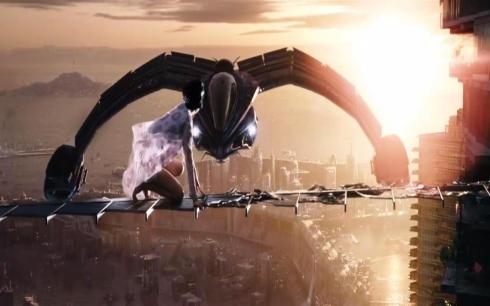
I’m shocked. This year was a damn good year for new movies. There were ups: Dredd, Total Recall, Argo, and downs: Prometheus, Looper, Flight, and the in-betweens: Django Unchained, John Carter, The Avengers, and this stands in direct opposition to the last couple of years, whose downs and in-betweens weren’t nearly as interesting. 2010 is defined to me as purely Scott Pilgrim, and 2011, purely Drive. 2012 on the other hand saw a deluge of good movies… but still not enough for me to compile a top ten list.
Maybe if I actually managed to see Life of Pi like I set out to, and maybe if I lived in a major city to see Zero Dark Thirty when it came out, but no, shut up — this is Dreck Fiction’s Top Ten Movies of 2012 Rundown, a list of questionable raison d’etre, outside of making ten arguably quality recommendations…
10. The Dark Knight Rises (2012) Dir. Christopher Nolan
I hate myself. When The Dark Knight came out and everyone loved it, I could not see the value in it. Nolan’s sequel was boring, overwrought, and dumb as hell. Now, when The Dark Knight Rises comes out and people are generally positive on it but don’t think it’s as good as it could’ve been, I scratch my head yet again. I loved The Dark Knight Rises. It’s visually stunning, socially resonant, and exciting. So am I a contrarian for the sake of being a contrarian? At this point, I can’t tell, all the way over here in my lonely, argumentative corner. In some ways, I don’t care, because The Dark Knight Rises and it’s lack of Batman, introduction of neat visual icons, and cool dystopic story, keeps me welcome company.
9. Persepolis (2007) Dirs. Marjane Satrapi, Vincent Paronnaud
From what little I understand of comics, Persepolis and other autobiographical comics that dominated the underground scene of their time… set the medium. Nowadays any serious comic is like this, but I’d be hard pressed to find an artist with as powerful a story as Marjane Satrapi’s. This movie is beautifully animated, and tells a heartbreaking story of a difficult coming of age during bloody history in the making. It’s a microscope pushed all the way in during a greater conflict, and the humanist themes found are just as emotionally sweeping as in any great war epic.
8. Total Recall (2012) Dir. Len Wiseman
With every remake, we ask: did we really need a remake? The answer is almost always “no,” but I’m glad for a few reasons we got Total Recall 2012 (maybe in fifty-eight years we’ll get a Total Recall 2070). One reason is that for a sci-fi action movie, it isn’t boring as all get-out. There is action from start to finish, which is plainly shocking. How did they afford that? Typically the action movie dynamic is: all the action scenes are super expensive so they can’t be all the movie, so let’s pad this out with exposi — oh shit we forgot to write a story. Here, it’s not only action but action in a lavish sci-fi world. A familiar one, yes, but hey. How many movies are set in current day L.A.? I could stand to see a few more set in 2019 L.A., if I’m being honest.
7. The Man with the Iron Fists (2012) Dir. RZA
This movie and Cloud Atlas really bum me out. In twenty years, people will look back on them and call them cult classics. Movies that fucking failed financially, finally fulfilling forgotten… (where am I?) finally gaining notice only when it’s too late for the filmmakers to benefit and make another. These movies are really something else, and it totally upsets me that people call for originality and novelty in their movies, and then slam these two for being different. I don’t have much new to say on The Man with the Iron Fists, other than I’m so glad I saw it in theatres. I’ve missed way too many modern cult classics — Slither, Grindhouse, and Scott Pilgrim come to mind — when they were in theatres and making no money.
6. The Raid: Redemption (2011) Dir. Gareth Evans
I curse The Raid: Redemption for only one reason — it partially ruined the otherwise perfectly fine Dredd. This is a martial arts movie that goes for the hard hits, and even though I’ve seen that meth lab battle a few times, I always wince at the big impacts. I haven’t been this physically affected by an action movie since the first and second viewing of Crank 2, in all its nipple-cutting glory. I love energy in movies, so if you want to be blown away by a pure action spectacle (think 300 but with no slow motion and an actual story), The Raid: Redemption is just as good as everyone says.
5. Chungking Express (2005) Dir. Wong Kar Wai
Wong Kar Wai is a vicious filmmaker who goes after cinematic conventions like a Charles Bronson-esque vigilante. Though I can’t get my head around how he does it (I assume, with his method, he’d have to fuck up at some point — he’d have to), I’m glad he makes movies as good as this, Chungking Express, often considered his best movie (though I prefer 2046). This movie is two parts — two love stories featuring gorgeous people in a gorgeous city looking despondent through windows at each other.
4. Battle Royale (2000) Dir. Finji Fukasaku
Django Unchained wins points for its tremendously bloody violence, but there isn’t too much of it in the end. Battle Royale somehow manages to keep its chaos going throughout its run, and though it’s generally difficult to stomach (fifteen year olds in school uniforms machine-gunning each others’ bodies apart), the adrenaline matches your guilt. I don’t like the idea behind this movie, I think it’s a little too harsh, but it does create the scenario I love from horror-comedies (this is not horror-comedy, for the record), where characters react realistically and funnily to an insane situation. I think to that scene where two students are shooting at each other at the start of the game, hesitating and stumbling over each other like the fisticuffs in It’s a Mad, Mad, Mad, Mad World. I’m a little dissapointed that Chiaki Kuriyama went out so quickly, and that after Kill Bill: Vol. 1 she didn’t do much high-profile stuff… but the shotgun dude was cool, and he made up for it.
3. The Road Home (2000) Dir. Zhang Yimou
As much as I might bellyache over The Road Home‘s core conceits, that of good ol’ fashioned, freeze-your-ass off transcendental living, y’all goddamn cityfolk, and one person’s definition of feminism in the obsession and stalking of a man, I can’t help but be utterly silenced by its sweeping, rollercoaster romance. Its got easily my favorite score I heard this year, with that main theme swelling in just the right points in the narrative, keeping the tears inside on a steady flow. For such a tiny story where scope and scale are concerned, there are moments that feel like punches to the gut — this is exemplary cinematic storytelling, audio/video as literary device akin to In the Mood for Love. The sequence of our heroine’s initial courting of the dude builds brilliantly: she attempts to wait for him as he walks along the road (home), but gets cold feet and ducks behind the bushes three or four times. When she finally sums up the courage, she passes him on the road (home) and he gives her a nod. She smiles really big and the theme swells — no dialogue, all expression.
2. Cloud Atlas (2012) Dirs. Andy and Lana Wachowski, Tom Tykwer
Like I said earlier with Iron Fists, this makes me so sad. You’ll notice that when critics talk down on Cloud Atlas, their criticisms are vague as hell. I don’t believe they know why they hate the movie, and frankly, sir, I don’t believe I know why I like the movie. But I felt it as I sat there in an uncomfortable ass, stadium-seating-impaired theatre, craning my neck upward. The movie pounded with life and imagination, it was like a guided tour through three of the most creative minds in film. I don’t know what we were meant to take away from the film (a reason why it’s not #1), but I feel like if I were to begin deconstructing it, I’d ruin the purity of experience for myself. Also, go Keith David!
1. Brokeback Mountain (2005) Dir. Ang Lee
“Are they gay?” my friend asks when I’m watching it for a second time.
“I think… they’re confused.”
The right answer is simpler: it doesn’t matter. Labels have no place here. This is a story about individuals who are destroyed by such things — cultural expectations, masculine and familial priorities — so any frazzled critic who shouts that calling these characters homosexual marginalizes the bisexual community needs to sleep on it (back in 2005). The characters at various points in the movie maintain that they’re both straight men, and this represents a major failure in American (and global) society. Brokeback Mountain doesn’t point fingers or complain, it does a movie’s job, and makes a much more powerful statement in doing so. One of its most sympathetic characters is actually one of the two men’s wives, and indeed, the film illustrates the destructive power of intolerance in the female characters it reaches indirectly. In my opinion, one of the most heart-wrenching (if somewhat hokey) lines is delivered by Delmar’s (Heath Ledger) second girl.
For a supposedly straight male, I tend to concern myself a lot with LGBT issues (there’s that contrarian again?), but Brokeback Mountain doesn’t speak to The Man Inside me (who will one day walk free of the pain), but the humanist I aspire to be.
So there you have it. See you round.
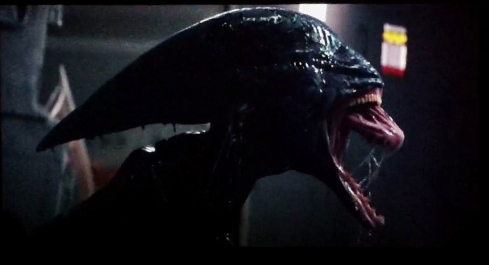
So now Dreck Fiction’s taking an official indefinite hiatus. It jangles my jingle when websites I enjoy haven’t updated after a week and then two weeks and then three weeks but I keep checking anyway, and I shudder to think that there’s some poor shnook out there who reads this site. The posts have been slow and that’s because there’s been some stuff going on behind the scenes. As a wise man once said, “Nothing is over,” so Dreck Fiction won’t be all daises and shit, not yet.
In fact, there’ll be one last post in the near future, the Year Ender. But beyond that, there will be a more focused, tactical approach to what goes on here. And now to reminisce…
It’s been three years, I think. Dreck Fiction started with a mental mission statement to ‘legitimize science-fiction as a genre in film,’ but I immediately started talking about John Singleton movies. I was young (two years is a big difference when it’s seventeen and nineteen [not to imply myself an aged mature]), so I wrote about whatever the hell I wanted to, man.
That’s the safest route to no audience, but I knew that at the time and it’s not a huge concern. The concern I suppose is purpose. I don’t believe in contributing to the vast, big nothingness of the Internet with nothingness of my own, so I have to rationalize each decision on what gets the toss on up here. (This made the cut).
To be continued. A few months from now there’ll be some probably better content. Or at least, content that’s actually organized and related to the genre of science-fiction.
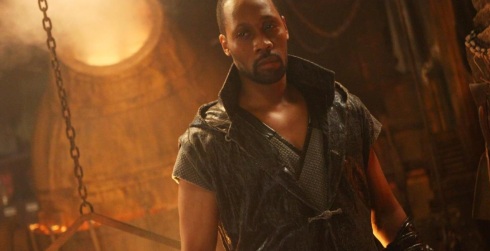
Kung-Fu masters with heavy metal hair kick each others’ bodies apart while the Ol’ Dirty Bastard raps about running game. This is the first five minutes of the RZA’s heavily anticipated directorial debut, and it is exactly what we were hoping for. The action is frenetic, and bloody as hell, and the music, while sliding toward the more traditional as the film goes on, completes it to create a satisfying whole. The hip-hop/martial arts aesthetic has never been better, and The Man with the Iron Fists is not only an essential piece of that legacy, it’s self-aware and exciting niche entertainment.
A decently complex but well-designed story structure is held together by running commentary of the Blacksmith (RZA), who feels at once out of place, with his modern locution, and spiritually engaged. We move from character to character under this guide, learning who the players are and how every piece fits into place in anticipation of the final showdown. The plot builds toward what promises to be an explosive ending, telling of a shipment of gold that’s headed through the violent Jungle Village, where seven deadly clans have gathered to wage war. Infighting in the Lion Clan has put a warmonger on top, a goofball psychopath named Silver Lion (Byron Mann) who seeks to claim the gold.
He stays in Lady Blossom’s (Lucy Liu) hotel, the same place where later a mysterious gunfighter, Jack Knife (Russell Crowe), will establish his lethal presence. Meanwhile, Zen-Yi (Rick Yune) is told of his father’s death at Silver Lion’s hands, and treks back to Jungle Village to avenge him and take the clan back. Predicting this course of action, Silver Lion dispatches his chief assassin, Brass Body (Dave Bautista), to deal with it.
Everyone needs a weapon, and so they all turn to the Blacksmith, who only wants to leave with his woman, a Blossom Prostitute known as Lady Silk (Jamie Chung). There are many characters here and a lot of recognizable names. As a co-screenwriter, the RZA manages to balance all of them equally, allowing for even minor characters like the Gemini Killers (Andrew Li and Grace Huang) ample screentime for badassery. There are also some key cameos, though apparently I missed Eli Roth’s. Watch for that one, I guess.
With RZA as a director, this does in a few ways feel like a debut film. The camera isn’t always confident or well-placed (though a few shots are downright beautiful), but the action is great — hyperviolent, flamboyantly bloody, and visually stimulating. There’s a rhythm to it that I assume a rap producer must have a feel for — the speeding up and slowing down for crucial moments and amplification of impacts is second nature to someone who not only lives and breathes musical timing, but has gorged himself on a lifetime of martial arts cinema to know well what works and what doesn’t.
And the story is perfectly structured for this premise. It’s an action movie, so there’s no muddling of the action with boring mythology or cliché and boring characters as in the last live-action Hollywood Chinese martial arts movie — The Forbidden Kingdom. Though this lacks the star power of that movie, it has a cast that not only looks great in their crazy costumes, but provides energetic or appropriately brooding performances. A particular standout is Byron Mann, whose Silver Lion enjoys what he does just a bit too much.
Though the RZA as an actor seems to take a backseat to the others, he shows his stuff in the moments he provides for himself, playing the Blacksmith with a subdued rage and mystical spirit that comes through in those sad, sad eyes. His voiceovers are just so damn entertaining, and his physical performance is believable in its own, fantastical logic.
On the writing side, there is a lot of dialogue that works, but is somewhat ‘dropped’ by awkward shot choices. There’s a moment early on where one of Silver Lion’s cronies agrees with a fellow soldier in that very obvious, bandwagon way, and the Silver Lion begins to call him on it, which feels like the setup to a punchline that never comes — there’s never a reaction shot of the dude, or really any change in frame at all from Silver Lion. It’s the small things like these that will eventually have you wondering abour later moments, like when the female Gemini notes that the Blossom cook’s beef is spicy, and he responds, “Oh goooood,” rather strangely but seemingly deliberately. Why include that moment at all?
Complaints are small and those are all of them. The Man with the Iron Fists is a hugely entertaining action movie with memorable characters and a plot that builds and intrigues, rather than complicates and alienates. Tarantino provides an introduction and trailer for Django Unchained before the RZA’s movie starts, and the Jamie Foxx-led ‘southern’ looks damn good, but the bar’s been officially raised for balls-out, exploitative, genre-literate violence.

5 problems for Resident Evil 5 (the movie).
This is a mission movie. Alice wakes up in an Umbrella facility the prisoner of past heroine and video-game avatar Jill Valentine. As Jill tortures her noisily in between asking somewhat inane questions like “Who do you work for?” there are secret forces at work. That being Ada Wong, another game character here introduced into the series for what might be the first time. Ada is working for — excuse me, with — Albert Whiskers, who releases the super-powered invincible zombie fighter Alice and also sends a crack team to retrieve her. The two parties fight their way through, meeting familiar faces along the way.
Problem #1. Retribution could have easily not have happened in this series. At no point does it offer a sense of self-worth or place in the storyline. I may not be the fairest judge of things, as I missed the last two in the mega-franchise, but I’m led to believe that perhaps the storyline itself may not be so valued. I wonder if somebody at the beginning, or around Apocalypse, decided to create a bare bones, rough rough outline — a plan for future installments to create a decent through-line. If they did, surely Retribution wouldn’t be on it, because it doesn’t advance the story. Or, it doesn’t do what fifteen minutes from another movie couldn’t.
It starts and Milla Jovovich is being shot off a boat that’s getting hit by Umbrella I assume, and she falls in the water. She wakes up in a facility, and needs to be rescued. The conflict is setup in the film — she could have easily not have woken up in the facility, and continued on her merry — with only a minor connection to the previous movie.
Problem #2. This is a lot like the original Resident Evil, which saw trained commandoes roving through creepy corridors and exploring biomedical facilities. It’s kind of like Aliens — and this would make Retribution the Resurrection. Only, instead of the more heterogeneous squad fighting aliens in inventive ways and everything’s an extremely bloody cartoon, Retribution is zombies and severely displaced game villains. Zombies with guns is gonna be your chief antagonist, among the axe dude more familiar in an African setting, and a giant Licker that once again reminds us of the original.
Zombies with guns? Come on. They’re the worst. They have the worst qualities of people and monsters, combined into a moorish alchemy blah that’s just very boring to watch. I didn’t even like the zombies with guns in Resident Evil 5, and that’s one of the great co-op games of recent memory. I want more monsters. Zombies feel cheap. They’re also rather unimaginative, especially in the context of a series with no shortage of interesting creatures to blast with acid rounds. Oh wait, you don’t do those either, Mr. WS.
Problem #3. They try something interesting here. I’m sure that the clone thing was born out of “How the fuck do we get M-Rod back in here?” but it might be the most recent example of my favorite phenomenon in movie series that have gone on too long — they have to come up with weird shit to keep it fresh. Back when we had so many horror franchises, even the weird shit went on too long, when everyone from Jason to Pinhead went to space with the Leprechauns. Here, we get clones that the artificial intelligence controlling Umbrella (the Red Queen from the first movie) uses in preposterously over-the-top experiments that test… something, I’m sure.
We have clones running around in artificial environments, not quite knowing what’s going on. How could you explain it to them, especially when one is a four year old girl? It’s an interesting premise, but it shouldn’t be here, and should be actually fleshed out. When the clone daughter of Alice asks if she is indeed her mother — upon facing a room of blank Alice clones — Alice says, “I am now.” What? I am now? Jesus, WS, you came really close to actual sci-fi drama. All she needed to say is — nothing. Just looked sad because in that moment, she was powerless.
But wait…
Problem #4. Alice is the most powerful thing in the universe. She’s always got an answer, and unfortunately in that moment it was a dumbass one-liner. I am now. Yeah, that helps. Also, when Leon Kennedy (yes) tells her to not go Ripley-style back for the clone girl because she isn’t as important Alice, Alice says, “That’s where you’re wrong.” Actually, no. He’s absolutely right. But you could’ve said, “I’m the most powerful thing in the universe,” and strode off. Why justify something that’s so wrong? Yeah it’s sad that this girl has to die, but you’re the one who’s supposed to save the last twelve humans on Earth. I think they need your help, because everyone else in this movie is shit, unless the plot requires them to be something else for the moment.
And about the clone thing one more time, it’s interesting for sure, but it means literally nothing. The AI that runs the place is like malfunctioning or something. These tests play out for no reason, or at least, to the whim of a computer. Take the zombies out, and you’d have like a poor man’s Eagle Eye. Make it a bit better? Poor man’s I, Robot, perhaps. I haven’t seen Colossus: The Forbin Project yet. I know you can’t reference Eagle Eye without that and expect to be taken seriously.
Problem #5. The Underworld moment. As if the connections between the two franchises weren’t many and varied as is, now we have to have Ada Wong doing the one thing we thought was cool from the entire Underworld series, that time Kate Beckinsale shot through the floor and went to, you know, like a different floor. Seriously, to close this out, let’s list all the weird fucking connections between Resident Evil and Underworld…
– They’re the two biggest and only sci-fi horror franchises of the day
– “Strong” female characters (but they’re both tabula rasas)
– The leads are married to the directors (Anderson, Wiseman)
– Genre-challenged genre mashups (The Matrix meets… Hammer horror)
– Title etymology (Evolution, Extinction, Afterlife, Awakening, Apocalypse — can you tell me which are which?)
– Wentworth Miller (Speedman’s co-worker in the first Underworld)
– They’re both poor substitutes for Blade
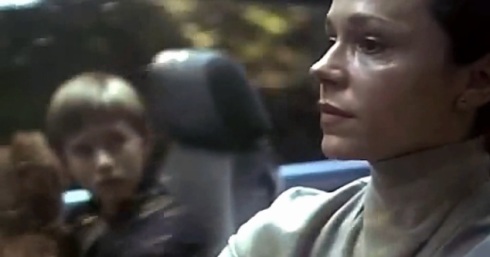
The movie winds toward a resolution that cannot possibly fulfill the needs of our young, young hero. As David, Ted, and Joe descend through their increasingly dark journey, we can feel it. The only door at the end of this path they stumble down is a fate akin to death — depressing, resolute, yet somehow worse, as even though we all die and that’s sad, we understand death. The end that slow approaches isn’t something David can understand.
Spielberg is responsible for some of the best science-fiction adventure films of all time. Jurassic Park is thematically dark — as a cautionary tale about man’s futility against powerful and ancient forces — but it’s infused by an inspiring sense of adventure that sees its heroes bound from set piece to set piece. There’s a great wonder in its world and its creatures; it brims with ideas as it does imagination. AI on the other hand is related on the surface to this earlier film, but is unremittingly bleak. I don’t understand how a filmmaker with such a filmography could make a movie without hope or any shred of light — I don’t understand why anyone would make a movie like this.
It tells the story of David, a robot programmed to love and designed to replace the son of a grieving mother. After the son comes back and David’s kicked to the curb at the one hour mark, the unblinking affection-droid stalks gloomily through an increasingly hostile and apocalyptic world on a quest to find the Blue Fairy. As the audience and everyone flesh-and-blood understands, David is chasing a delusion.
The sadness that drenches the film is a product of AI being pulled in two directions. Not Spielberg and Kubrick, but traditional drama and something… alien. Joe also believes David might find the Blue Fairy and turn into a real boy. Why would he think anything else? He’s a robot. They’re all robots, and that means that they’re damned to experience only a few things, think limited thoughts, and suffer the emotional toll. They themselves are being pulled in two directions: human and inhuman.
The movie required an eXistenZ moment, that brief flash that completely unsettles you — remember when Allegra Geller (Jennifer Jason-Leigh) repeats dialogue in the same intonation to Jude Law’s character, as if trapped by the rules of the video-game and rendered momentarily inhuman? It throws your perception of reality off and that’s what Jude Law in this movie should have done. We should have been reminded that Joe and David are robots for the sake of compelling drama, but it seems that the writer is more interested in the generic.
Interest in the generic isn’t the issue here, but the cost of what generic requires — the weight on the story that keeps the characters from going anywhere. Or at least, going to a place that is, once again, a delusion. The movie wouldn’t be so bad if it was more of a cerebral story about robots searching for meaning, but it is instead a story about humans who are told they aren’t humans who can’t be humans but want desperately to be human.
AI operates on a broken premise of human drama with a question pervading every step of its narrative — the layers of unreality in this case add up to a disconcerting ending. The question dogs an audience sympathizing in David: Is he going to realize that his journey is futile? And if he does, is his face gonna fucking melt again? Here’s a fake person struggling against an impossible enemy, one manifesting as fake, artificial nothing.
The so-called aliens, as so many are enthusiastic to point out, give David a happy ending. His mother is alive for one day the last human on planet Earth after two thousand years. His mother is essentially programmed to love him, and he is programmed to love her, so it works out — a exercise in flailing. The aliens (the robots that constitute a generally very cool idea in SF, evolving into pure shapes after generations of human absence) don’t understand because they’re so removed from humanity. Here it is again — that as a science-fiction idea follow internal logic, but because the aliens conform to the lines of human drama, the whole thing is ridiculous. They may be executing correctly, but they operate on a confused premise.
The audience watches these fake things spinning out in their predetermined paths — this is what robots will do without humans. They’re like computers playing out computer business, but because this is an important drama by Steven Spielberg, it’s a clusterfuck.
Believe me, I hate the term clusterfuck. I don’t use it lightly. But AI is a horribly depressing movie that’s nearly offensive. It reaches but is constrained by its mainstream potential. It needed to commit to a style or genre, but didn’t. A good analogue in the film is the Flesh Fair. Good concept, but held back by cliches: the evil Christian shit, the Tron-reject motorcycles with neon dogheads mounted on the front, and the improperly motivated scene’s end. A movie likes this didn’t deserve to be another common denominator throwaway.

A man like Neil Marshall makes Doomsday because he thought a futuristic soldier facing down a knight would be cool. A man like Neil Marshall makes two critically acclaimed horror movies and then obliterates expectations with his third.
A man like Neil Marshall is one the last great champions of genre cinema.
Though he’s in a league with Edgar Wright and Robert Rodriguez — the modern day John Carpenters of our world — he fell down with Doomsday, such that his next film, Centurion, went seemingly unnoticed, leaving his future in uncertain terms. It’s hard to believe, really, because the philosophy behind Doomsday was so genuine, though some might say naive. He wanted to make a movie so absurd you’d be compelled to laugh, but also find yourself enjoying some of the best R-rated sci-fi action in years — nobody makes movies quite like this anymore.
Dog Soldiers

I don’t think this is technically his feature debut, but it’s a strong start for a career nonetheless. Making use of minimalist settings and a creepy atmosphere, Marshall managed to make one of the few cool werewolf movies in existence. And certainly the last, though I’m sure a few movies made in direct answer to Twilight will challenge Dog Soldiers.
As one critic put it so well, this is like Alien, Predator, and Jaws all rolled up into one — but with werewolves. It feels derivative, but in that good way. It’s familiarity done with enough style and care that it feels fresh. There’s some gore, some ooh-rah soldier stuff, way too much foreshadowing, and a lame twist at the end. A formula for success, often necessary with such formulaic subject matter.
Right, there’s a lot of dog and wolf jokes/puns at the start of the movie. It feels like a beginner’s screenplay in that regard, but it isn’t quite enough to push it over the edge, into absurdity. Leave that for the one after next…
The Descent
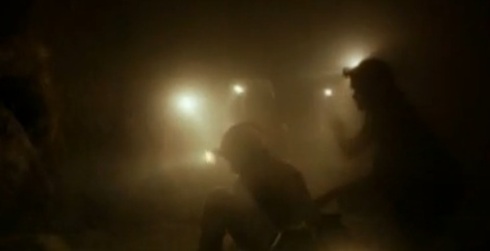
I don’t care for this movie. It’s drawn out and the monsters are not scary or that well-designed. Visually, that is. In other regards, there’s implied history to them, and it’s pretty creepy, but I actually prefer the nonsense lizards from The Cave, or whatever the fuck. The Descent was white-knuckling in its first half, with these women being claustrophobic in caves, and getting stuck and running high tension. I can’t imagine a better place to set a horror movie. Cave-diving is not escapism, James Cameron.
The flaws of this movie, like the aloof narrative and out-of-the-blue moments could at the time be excused, or even appreciated, as horror movie unpredictableness, but the next movie would paint them in a new light.
Doomsday
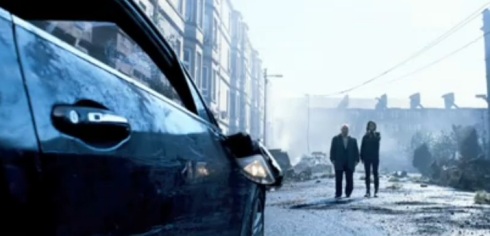
When Doomsday was announced and the trailer was released, people whined. They said, “It’s 28 Days Later meets Mad Max meets Escape from New York.” Now, I don’t know what fucking planet these people live on, because no way does the combination of Mad Max and Escape from New York equal anything but Yeah. Was it just the derivative nature of the project that got people so frazzled? Perhaps it was an insult to their intelligence, because they perceived the movie to think it was being original, on the grounds that, well, most movies tend to do that. But of course the rip-offs were so glaring that it seemed to taunt the audience.
Doomsday, rather, the reaction to Doomsday, is proof that we live in a cynical movie-watching world. As soon as one watches the film, they’ll realize that the director was not only paying homage to these earlier movies, but having a complete blast with them. It’s the same principle, but on a much different level, as what Peter Jackson did with King Kong. Marshall wanted to introduce this genre to a wider audience, though he may not realize just how inventive the film actually is.
Yes, it uses the structure of Escape from New York as a base, but that’s fine because just like how Waterworld is a perfect Mad Max 3, this is a great sequel to Escape from L.A., following in the same conventions that that film set up — that being, this premise of crazy people clustered together is going to breed some batshit insane obstacles for the hero to meet. This post-apocalypse movie isn’t just about zombies or cannibals or viruses — Rhona Mitra’s character Maj. Eden Sinclair (awesome name) is going to fight medieval knights in an arena and get into car chases with barbarians who tape their beheaded girlfriends to one piece so they can drive together.
Doomsday in this regard recalls Total Recall, another gory 80s movie that didn’t come out in the 1980s. And much like Total Recall, Doomsday in its day was not well understood. There’s a joy in novelty and invention in Doomsday, and a lot of these scenarios and things are born out of sources we’ve all enjoyed, but kicked up to a new extreme. It’s not only one of the best sci-fi movies of the decade, but one of the goriest and most fun action movies too. This rabbit will be blown up by sentry turrets for — well, for absolutely no reason.
Marshall also introduces two things here that carry over into his next picture: a strong female character, and an impressive ability to have the audience invest in characters they know nothing about. For the latter, we have these two soldiers who survive by Sinclair’s side longer than they have any right to. I assumed they’d die at every encounter, because truly this is her show, and these guys have no characterization. What they do have, and this was seen in Dog Soldiers, is solid chemistry. Despite the carnage and the macabre setting, these two have a laugh as they take out cannibals with axes, and by goofing around — and even just surviving up to a late point — I didn’t want to see them die. For an action movie, this is a preferable, on-the-fly alternative to actual characterization. Good on you, Neil.
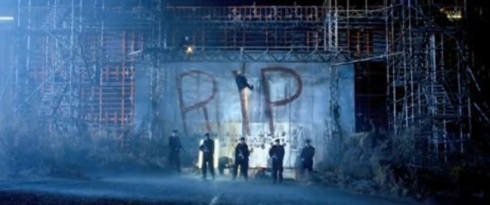
Then of course we have the tough girl, played by the woman who looks like a tough girl despite the beauty — Rhona Mitra. While she may not be as compelling to watch as the next female character to be discussed, Maj. Eden Sinclair is one cool chick, with a fake eye and a knack for killing gladiators. She’s a badass, but she’s a believable badass. Not only does Rhona Mitra look like an athletically capable woman (rather than Milly from Hard Revenge Milly, to use a recent example, who looks like a pretty normal person you’d see walking around), she isn’t the action hero god that trounces everyone. She gets beat up and tossed around, and this puts her on an equal playing field with the villains.
Last post I lamented the fact that Milly wasn’t the action hero god. That’s because I want a movie like hers to be a slasher flick, but with Doomsday, it’s more appropriate that Sinclair is a realistic badass. It heightens her moments of victory, and adds tension to hand-to-hand fight scenes with spears in swords… in the future.
Doomsday will keep you guessing, and Neil Marshall leaves you in good hands with Eden Sinclair, who’s got the tacit nature of her most obvious inspiration — Snake Plissken — with an all-soldier, no fucking around attitude that’s pretty rare, even for dude action heroes. It’s confidence without the one-liners, and the badassery to back it up.
Neil Marshall is also ballsy enough to take an unbelievably beautiful South African stunt woman and paint her face beyond recognition, and then behead her… and then reattach the head in vain. I am so ashamed that I skipped this movie when it came out in theatres. It’s right up there with Slither and so many others…
Centurion

Doomsday was a sci-fi movie that wanted to be a sword-and-sandals movie, so let’s just make a sword-and-sandals movie. While this one lacks the wacky nature and imagination of its predecessor, it has the same level of bloodshed and action. If you’re in town for a straightforward, bruising actioner, Marshall is your man. Centurion stars Michael Fassbender and Jimmy McNulty himself as soldiers of the Ninth Legion, which went missing during the expansion into Pict territory. This is that story, though historical accuracy is not something we come to a movie like this for.
We come because we know it’s going to be a ride, one with plenty of blood and running around in beautiful Scotland scenery. There’s also a lovely Olga Kurylenko all done up to look like a barbarian, whose Etain is savage as hell but still manages to look sexy. Indeed she is the greatest draw, and plays a great part in the film. Centurion, despite the violence and overall intensity (“I AM A SOLDIER OF ROME! I WILL NOT YAAYLD!”), borders on generic, and requires that iconic image of deadly Etain with her facepaint to stand out.
There was a moment in Centurion where I felt the story could’ve capitalized on the L.L. Cool J mentality from Deep Blue Sea, that of having two stories interwoven, where one is basically irrelevant and all the better for it, but the two soldier who get separated don’t have much screentime as such, and leads to an anti-climax within the narrative. I really thought that dude was gonna kill those wolves and make it back, which would’ve made no sense and been more Marshallian.
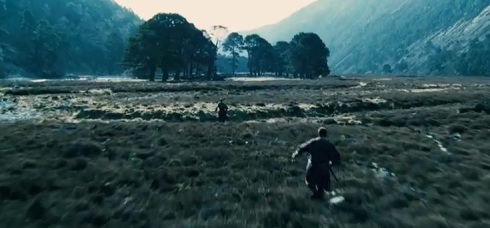
There’s kid killing and CG blood explosions — that which we adore from Doomsday, but none of the same elements that make you say ‘wow’ and sit up, save for a particularly nasty eye-trauma. Good, but not great. Memorable certainly for Etain, a performance that’s subtely animal, though we get the feeling that a great deal is blasting through that bloodthirsty brain of hers, maybe even some humanity.
Conclusion
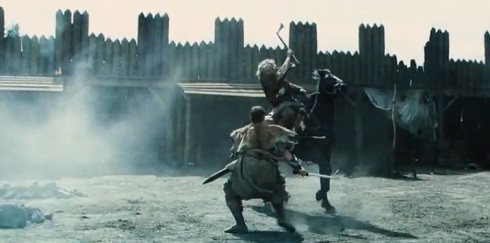
Neil Marshall is a complicated thing. We’re not used to filmmakers who make movies because that’s their interest, and they want to make movies. Odd as it is to say. He’s not interested in the business or in making money, but having fun, which produces some of the most unpredictable and lively entertainment in movies today. Whatever his next movie will be, I can’t guess at subject matter, certainly, I can only hope that it arrives soon.
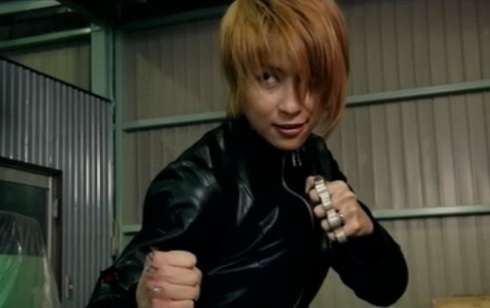
Bloody Battle is 10% more futuristic than its predecessor, as measured in the new style fancied in the gangsters of the day — gas masks. The two movies take place in a familiar post-apocalypse, one where it’s likely that down under Master Blaster upholds his power in Barter Town, though Japan has a more cyberpunk feel (if Versus can be said to have a horror movie feel, for example). The war-torn buildings and desolate interiors offer an appropriately impressionistic environment for our formidable heroine Milly, though they also offer the audience’s best guess that Hard Revenge Milly: Bloody Battle is after all, a budgeted affair.
Though a larger world is implied, much of the story unfolds in parking garages and non-descript warehouses, with the occasionally dressed-up set peppered in for world-building’s sake. Fortunately, by the endgame this actually registers as insignificant, because the action these environments house is a specific flavor of stylized ultraviolence, one with flying kung-fu, cool poses, and wacky weapons that inflict impressive spectacle when unleashed on smug, gas-mask-clad do-wrongers.

The action in the film is one end of the Hard Revenge Milly equation that’s so frustrating. The premise of this sequel doesn’t stray far from the original’s plot, certainly not for the purposes of puzzling out what’s so problematic in an otherwise highly entertaining gore-fest. Milly, after massacring the gang that brutally murdered her husband and set her baby on fire, while at the same time tearing her body apart with knives and forcing her to watch, finds herself hunted by friends of the gang — as we learn from the hardly comparable Chan Wook Park’s Vengeance Trilogy, revenge is a cyclical, spiralling affair.
At the same time, Milly is approached by a young woman whose lover was killed, and seeks training for vengeance of her own. It may not sound like much, but keep in mind that the original movie was 45 minutes long, and this one still isn’t quite average feature length, clocking in at 74 minutes.
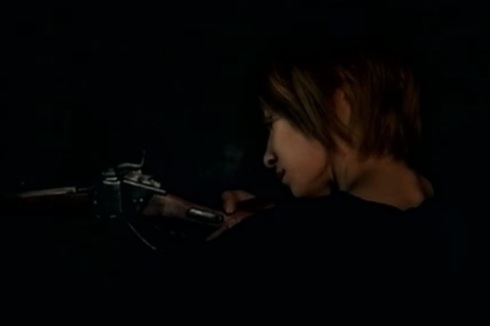
So what’s the trouble with Hard Revenge Milly?
The opening fight scene embodies a rare and beautiful ideology in action movie filmmaking, where the action hero is depicted as a slasher villain in how he/she dispatches foes. The only contemporary example that springs to mind is the critically discarded Punisher: War Zone, a film that sees Frank Castle slaughtering villains as if they were zombies — heads explode, bodies explode; the carnage is front and center, and there’s a gleeful joy in the application of a crazed badass to the action.
When this badass is essentially the Terminator, the entertainment is in the creativity of the hero killing slimy villains rather than the drama of ‘will the hero prevail?’ since there would clearly never be a question (there never is a question, regardless of what action movie you’re watching, but let’s not parade on the dreams of the Len Wisemans and the McGs of the world*). Punisher: War Zone succeeds where the 2004 Punisher fails (for one) in the villain department, because there’s a nemesis cold war going on — Frank Castle might be crazy, but Jigsaw and Looney Bin Jim are batshit. John Travolta? Not very threatening and surely no threat to Thomas Jane, which deflates the drama of ‘will the hero prevail?’
War Zone goes above and beyond, then, where Castle has gangsters to kill like a regular Jason, but with more RPGs, and these guys are no threat, but also a villainous element that provides any measure of suspense. Hard Revenge Milly: Bloody Battle, as well as its predecessor, have the same pretty Japanese pop-singer dude who happens to be a badass.
It’s odd, because while the end fight of the original is much longer than any other fight scene in the movie, it’s less entertaining because the guy offers a sizable opposition, and this is not what we were being driven toward with Milly tearing through people earlier. What makes this guy special? His kung-fu seems to be pretty good but he looks like everyone else and isn’t characterized appropriately in this regard. The sequel does a little better by having the villain be a cyborg, but any cyber-fuelled cool factor is negated by his villainy stemming purely from his sexual deviance — aka homosexuality. That’s great, guys.

This may sound like a lot of talk for something pretty unimportant, but the in-the-moment result is that Milly gets thrown around a lot by these lame villains where she should be trouncing everyone, save for something actually impressive. Anything other than yet another gangster dude. Like the Bride, Lady Snowblood, or Lady Vengeance, Milly gets her gender-equality fair share of the action movie beating, but to me it doesn’t make a lot of sense given the premise of what these movies are. This might sound like sexism, and it probably is, but this time, I honestly just don’t give a fuck. I don’t want to see a woman nicknamed Hard Revenge Milly getting her arm chopped off and defeated, only to win with further cyborg upgrades further down the road.
Not to mention that Milly technically falls into that more recently popular category of kick-ass females, here dubbed the Dragon Tattoo category, where only rape or violence against the heroine can incite bloody rebirth. That’s not a big deal here, because not only is Milly’s origin story so absurd, the movies are extremely obviously not meant to be taken very seriously.

I mean, look — when Milly cuts some dude’s body with her elbow sword, their high blood pressure sprays in an initially hesitant fountain in the grand tradition of Chinese and I think Japanese cinema. It’s great, silly fun, but it is metered a bit by Milly’s qualified badassery. That said, Bloody Battle is an improvement over an already entertaining original, one that reaches for eleven on the novelty dial in the fight scenes: we never know what her metal body’s gonna drum up next to slice and dice her foe, or what lethal new form this familiar weapon will take, but we know it’s gonna be bloody as hell. Meanwhile the action is intense and fantastical, remaining compelling through the whole of the two films with the promise that they’ll end in brutal, comedic splatter.
This movie is also interesting for its essence as a sequel. This is an instance where the follow-up deconstructs the original, showing the aftermath of the events in the first movie and the effects they have on the heroine. She isn’t just a killing machine, she’s a killing machine with no sense of control and a lost past that she can’t even be sure of. In a peculiar moment, Milly questions her memories in a spot of dialogue lifted straight from Ghost in the Shell. The self-deprecating doctor character plays Batou here, swatting down her Shirowesque cyber-Descartes existential quandaries much in the way the audience might.
Philosophical questions about revenge are paid equal lip service, but it amounts more to an intriguing setup to a theoretical third installment than an actually compelling discussion. Milly might be cursed by her vengeful journey, which infects others and only begets violence and death, but we’d rather see her kick some ass than mope around like the Major.
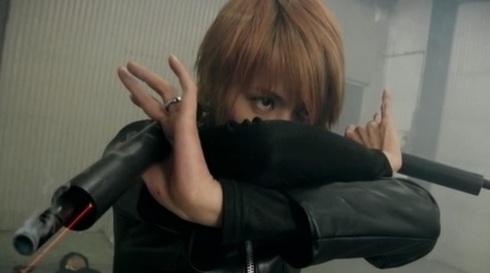
Or get her ass kicked by the villains, for God’s sake. Somebody needs to give this director, Takanori Tsujimoto, a bigger budget and put the lead, Miki Mizuno, in more action movies — they make a great team.
*Because I like Len Wiseman for some reason and I really enjoyed Terminator Salvation for some reason
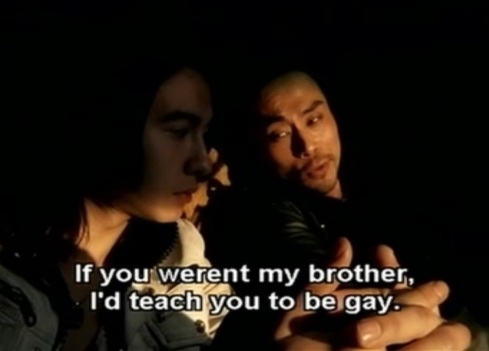

Total Recall is pornography.
I’m ashamed of myself — I was railing against the Total Recall remake in the days before its release, though mostly in jest, saying things like “It was Arnold, not Philip K. Dick, who made Total Recall great” and other words of wisdom in a similar vein. I wanted to see Total Recall for reasons a product of hard cynicism — ranging from “I wonder what an Arnold movie is like without Arnold” to “I refuse to see Batman Begins 3*”, but didn’t include “I’m going to enjoy this.” Why wouldn’t I enjoy this? Despite the director’s not sterling resume, and the bland, depressing source (remake of an adaptation of an uncinematic short story), this movie is a complete joy, an absolute gem.
Total Recall 2012 benefits and suffers from its modernity. Gone are the more outlandish elements, like vagina-faced mutants and ancient aliens, and with those things the rapid-fire pace of imagination that elevates the original, which is reduced somewhat, though a significant residual fleshes out the world. And what a world — there is a broad and intimate attention to detail in a cityscape that takes turns being as big, beautiful, and absurd as the green and vertical city from Vanquish and the best Blade Runner mean streets since the original, beating out strong contenders for the throne like Natural City.
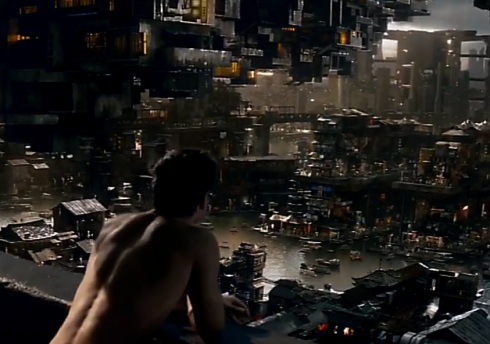
Granted, this reeks of ‘Christ, why even bother,’ much in the way of Natural City, and it’s true — Total Recall makes Minority Report seem more important than it is for crafting a Phildickian utopia that isn’t flooded by rain and defended by not umbrellas but neon parasols. It’d be a real issue if the city wasn’t so busy, so energetic, serving as a satisfying and dazzling backdrop for action that’s more intense and entertaining than expected in a PG-13 movie. It’s good action, not splatterfest action like the original. They’re both good, but in different ways. Nobody’s getting used as body shields, but I think Kate Beckinsale just punched Colin Farrell in the face with her vagina.
There’s zero-gravity, futuristic gadgets, and some very cool-looking robots thrown into the mix. It’s a streamlined art direction that offers a more focused, cyberpunk look than the original at the price of a playful, more unpredictable quality (like Inception vs. Paprika). Bill Nighy plays the resistance leader, but rather than being a mutant on the stomach of some other dude, he forgets where he is and assumes it’s The Matrix Reloaded, saying things like “Memories are constructs of the Mayan-dah,” and then looking up and winking at the Architect, who’s of course always watching.
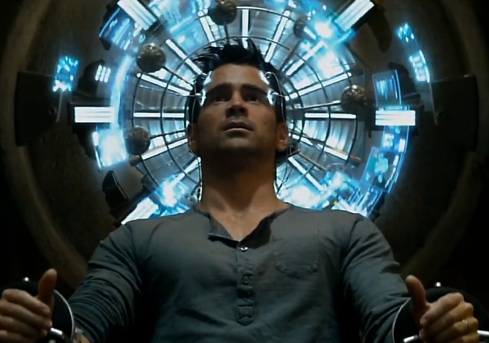
The characters are pale shadows of their former selves (with one alarming exception), as there’s nothing visually interesting about them, and the serious attitude of the film keeps dialogue on the straight. I never realized how much of a non-character Quaid was until someone un-Schwarzenegger played him — he’s a blank slate searching for his identity, which is a compelling premise for a character, though better yet a short story, but doesn’t make for a particularly charming or memorable hero. He’s good at killing people, and that’s what counts, along with the generally strong performances — Bryan Cranston will never play a goof again, you can count on it.
When the fight is done and the hero and heroine look in each other’s eyes, it hit me what a hollow experience this movie was, favoring the ideas over any character development or drama, and not expounding on those ideas as expertly as the author, or introducing any new concepts. But then I thought back and remembered how much I actually enjoyed Kate Beckinsale’s character going around doing stuff. It’s sad that Richter and Sharon Stone’s characters have been combined into one, such that Ironside never gets his arms chopped off by an elevator, and nobody gets pierced through the skull with divorce, but Beckinsale plays one awesomely ass-kicking lady, a villain who isn’t sympathetic or interesting, but is extremely fun to watch. She runs hard after Quaid, and her physical performance heightens the action. And obviously, she looks good doing it all.
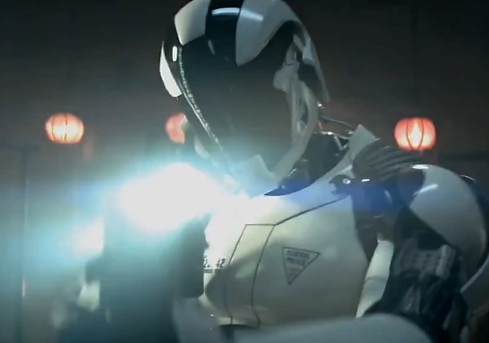
But this amounts to little more than pure guilt — guilty pleasure of the highest order. Total Recall may not be considered very important in the realm of science-fiction, but it’s unique for being one of the few action movies with nearly non-stop action. Quaid and Jessica Biel bound from set-piece to set-piece as the collateral damage and body count rise faster than you can groan at all the visual homages that put Terminator Salvation to shame. Why did the director say this movie would be more like the short story than the original movie? It’s just less like the original movie. There’s no tiny alien invasion, or anything completely odd.
This is a good thing, however. Total Recall 1990, an adaptation of a pretty good short story, is a really fun story, and I appreciate its immortalization in remake form, as well as the remake itself, which is an energetic and colorful adventure with a lot of pretty things to look at**, whether that be the city, the action, the robots, or the very attractive and active lead women.
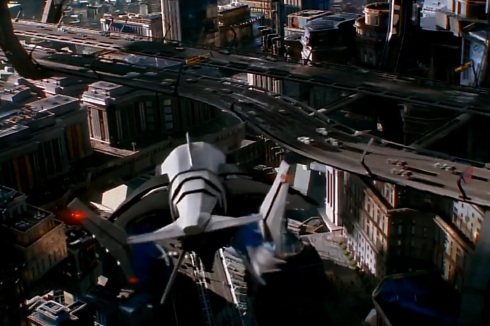
*(On The Dark Knight Rises): Hey, the fights may be hampered by poor fight choreography and dumbass costumes, but he finally nailed the cinematography (stood still) and surrounded the action with pure spectacle — more like Batman Begins than… that other one
**(On Art Direction): Just one problem: the guns. The pistols were fine, but I recognize the rifles from reality, or at least, the reality of near future weapons that find homes in like, Ghost Recon. They look cool, but why not design something new? I could be wrong… maybe it was just a dream.
Wu-Banger Alert: The Man with the Iron Fists (2012) Primer
October 23, 2012 in Commentary | Tags: Anime, Chambara, Forest Whitaker, Genrebusting, Ghost Dog: The Way of the Samurai, GZA, Japan, Kazuo Koike, Kill Bill, Liquid Swords, Martial Arts, Quentin Tarantino, RZA, Samurai, Samurai Champloo, Shogun Assassin, The Man with the Iron Fists, Ultraviolence, Wu-Tang Clan | Leave a comment
The Wu-Tang Clan created a unique sound in the 90s by sampling old kung fu movies into violent but passionate hip-hop lyrics — there was a combination of the east and west that was slightly more celebratory than the other east/west mashup where 90s rap is concerned. This fusion of martial arts’ philosophical themes and styles with the poetic and hard-hitting music creates a fascinating aesthetic that’s sustained a multitude of titles since. We’re finally seeing a major, mainstream entry in this legacy, with directorial guidance from the RZA himself — an expert in martial arts films and no stranger to the movie industry.
If you want to know what to expect with The Man with the Iron Fists or just want to see where the RZA is coming from, check out the following…
Samurai Champloo
This doesn’t have direct involvement from the RZA, but director Shinichiro Watanabe is familiar with combining a distinct musical style with specific film genres. Here it’s chambara film and hip-hop, with a killer opening song and frequent, kinetic action scenes. Champloo is a very good anime series but suffers from Watanabe’s own filmography — his previous Cowboy Bebop is considered to be the greatest anime series of all time. When you follow that with a very good anime — well, you can do the math. The series is consistent, dramatic, and frequently humorous. The characters are fun, and the overall feel is hip and stylish. The ending song is also great.
Shogun Assassin
This is one of the few movies where the English dub is actually mandatory. If you see it in the original language track you’ll miss the dialogue that the GZA sampled into various instrumentals on Liquid Swords. It’s small wonder why this film made such an impact on the Wu-Tang founder — it’s a strange little gem, completely unafraid of excessive sprays of blood and even violence against women: the kind that might make you cringe, but it’s all in good fun. And what’s more fun than seeing a badass baby riding around in a baby cart built of weapons with his stoic samurai dad? The ultimate family movie. It’s actually an edit of the first two Lone Wolf and Cub movies, so it takes all the action bits, and leaves out assumedly plenty of story. The Lone Wolf manga was penned by Kazuo Koike, author of among other things, Lady Snowblood, the adaptation of which had a major influence on the next on the list…
Kill Bill
Yep, that’s him alright. An alarming deletion of scene from Part II, where Bill fights this let’s say, Dynamite, Samurai
The RZA scored this, the original ‘two tickets, one movie,’ dealio back from when we didn’t know about a Harry Potter 7 or Twilight 4. Luckily this is one of Tarantino’s best, a balls-insane mashup of Italian westerns, Shaw Brothers kung-fu, samurai epics, and the gorier pieces of Japanese cinema a la Fukasaku and Miike. The Man with the Iron Fists is being produced by Tarantino, so I imagine the RZA will be benefitting here from an established creative relationship, as he does consider the great genrebuster a mentor. It might also, however, be like Frank Miller coming off of Sin City with The Spirit. Let’s hope not.
Afro Samurai
I’ve only seen the first episode. Interesting, but I haven’t heard great things about it. This is probably more hip-hop than samurai, if Champloo was more samurai than hip-hop, but I’ve never heard anyone call it better than its Japanese counterpart.
Ghost Dog: The Way of the Samurai
Before the RZA’s directorial debut, Ghost Dog was definitely the quintessential Wu-Tang movie. It features Forest Whitaker as a Mafia hit man who lives by the code of the samurai. It’s a mostly tacit lifestyle, filled with night-driving and hanging out with the odd gallery of friends he amasses in a French ice cream truck guy and a scholarly little girl. It is a lifestyle punctuated by violence nonetheless, and the action in this movie is sparse but effective, particularly with Ghost Dog’s first kill.
Ghost Dog ‘sheathes’ his silenced pistols much in the way a samurai would a sword, and practices martial arts on the lonely New York rooftops, up there with the pigeons, his preferred mode of communication with the outside world. This is a quirky if uneven film, funny in places and dark in others, but overall an iconic example of the gangsta/samurai aesthetic, and proud piece in a legacy following films like Le Samourai and those of Kurosawa — it isn’t revision so much as it is celebration.
Celebration I’d say is a key theme. There’s an appreciation of many cultures, and a tolerance of such things that’s unprecedented in violent macho movies. Ghost Dog is very in tune with his inner spirit, and is able to communicate with his best friend the ice cream guy by pushing through the language barrier — it’s a deeper connection. The most telling scene is when the ice cream guy, fascinated by a man building a boat, yells down from a rooftop in French: “That’s incredible! How are you gonna get that out?” and gets “I don’t understand, but I have to get back to work!” as a response, in Spanish. The ice cream guy smiles and Ghost Dog nods, walks off.
This embracing of other people and foreign cultures is a cornerstone of this ‘subgenre,’ and I think there’s a lot to be gained in blending cultures, mixing philosophies and aesthetics to create modern mythology in film and music.
The RZA, who scored Ghost Dog, does appear in this film, credited as the “Samurai in Camoflague,” and though his scene is brief, it is perhaps the most appropriate role for him. Better at least, then the crackhead who gets killed in American Gangster. We’ll see truly how his acting skills (among other things) shake out on the 2nd of next month, but I have high hopes. He’s such a cool guy; it’d suck to see his movie fare poorly.
Oh, and the Italian gangsters in this movie are just crazy. If nothing else, watch this movie for them. They are not unlike the depiction of cosa nostra in It’s Always Sunny in Philadelphia.
So that should give you a general idea — these various titles the with direct involvement of the RZA, or that follow his approach to genre, are the Wu-Tang aesthetic and philosophy manifest in film and TV. The ultimate piece will be The Man with the Iron Fists, and if Ghost Dog and Kill Bill were the RZA’s film background, he’s in good shape.
Well shit — you see that picture with the eyeball!